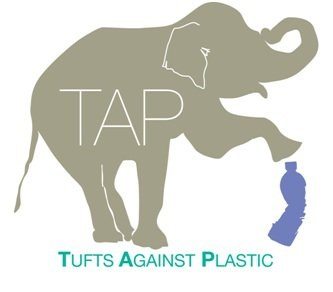The 24oz light blue Nalgene with a water bottle-stomping elephant on it has become a familiar sight around the Tufts Medford campus. Making appearances on the T, Boston Common, and even at Logan Airport, it has become a way to identify Tufts students outside of the immediate confines of campus. But what was responsible for the popularity of this particular water bottle?
 At the beginning of the Fall 2011 semester, returning students found that single-serving beverages from water to fruit juice had been eliminated from Hodgdon Good-to-Go. Members of an environmental action ExCollege class along with the Environmental Justice and U.S. Literature class joined to form “Tufts Against Plastic” (TAP), the driving force behind the plastic bottle reduction effort. (In previous semesters, the ExCollege class had led campaigns that ultimately eliminated trays from the dining halls and changed default printer settings across campus to double-sided.) During the Spring 2011 semester, TAP campaigned to raise awareness about the issues surrounding bottled water and circulated a petition to eliminate their sale in Hodgdon.
At the beginning of the Fall 2011 semester, returning students found that single-serving beverages from water to fruit juice had been eliminated from Hodgdon Good-to-Go. Members of an environmental action ExCollege class along with the Environmental Justice and U.S. Literature class joined to form “Tufts Against Plastic” (TAP), the driving force behind the plastic bottle reduction effort. (In previous semesters, the ExCollege class had led campaigns that ultimately eliminated trays from the dining halls and changed default printer settings across campus to double-sided.) During the Spring 2011 semester, TAP campaigned to raise awareness about the issues surrounding bottled water and circulated a petition to eliminate their sale in Hodgdon.
Tufts Dining gladly obliged and made the necessary changes to support the effort, which included giving away the reusable “Choose to Reuse” water bottle for free with the sale a fountain drink during the first two weeks of the fall semester. Dining has since made the Nalgene bottles available for sale wherever plastic bottles of water are still sold, and they offer a beverage discount for those who bring reusable bottles to Hodgdon Good-to-Go, Tower Café, Mugar Café, and The Commons. Those who forget their bottles pay 20c extra for using plastic cups, which can then be recycled.
A full semester after the initial change took place, Director of Dining and Business Services Patti Klos, estimated a reduction of over 133,000 disposable bottles per semester! That’s 73% fewer bottles from the previous school year when single-serving beverage bottles were still sold in Hodgdon.

One of the water stations installed at Grand Canyon National Park (Photo: Grand Canyon NPS/flickr)
Tufts is now part of a growing trend that can be seen across universities nationwide, although it’s not just college campuses joining the fight against bottled water. This past February, the Grand Canyon National Park announced it would discontinue the sale of bottled water inside the park, responding to growing concerns that scattered empty bottles were ruining views of the natural wonder. Prior to the National Park Services approving a plan to eliminate the sale of the bottles, 10 water stations were installed throughout the park to allow visitors to refill their own water bottles. Officials estimated that plastic water bottles accounted for nearly 20% of the park’s overall waste. Zion National Park and Hawaii Volcanoes National Park have implemented similar bans on disposable water bottles. Tufts Dining also installed water stations to promote bottle refilling instead of water purchase in a few locations.
While all of this news may seem encouraging to many students and environmental activists, it hasn’t come without a powerful response from the bottled water industry. The International Bottled Water Association (IBWA), a trade organization consisting of companies in the bottled water industry, has launched a defensive campaign against the “misinformation” being used to attract students to the movement. As a part of the response, the IBWA created a YouTube video to voice its side of the bottled water issue, suggesting that the cause is unworthy of students’ energy and resources. The video instead proposes that students tackle more pertinent social and economic injustices, such as racial discrimination and tuition hikes. The IBWA also argues that banning bottled water is taking away the choice of a product they claim is a healthy alternative, easy to recycle, and safer than tap water. A majority of activists disagree with most of these claims, arguing that bottled water contributes to excessive waste, and that companies have privatized what should be considered a human right into a profitable commodity.
Whether you agree or disagree with the elimination of plastic water bottles on college campuses, the evidence for Tufts is clear: plastic bottle waste has significantly decreased, which is a step in the right direction in creating a more sustainable future.
For more information, visit “Bottled water is out, water bottles are in at Hodgdon Good-To-Go.”

Leave a Reply